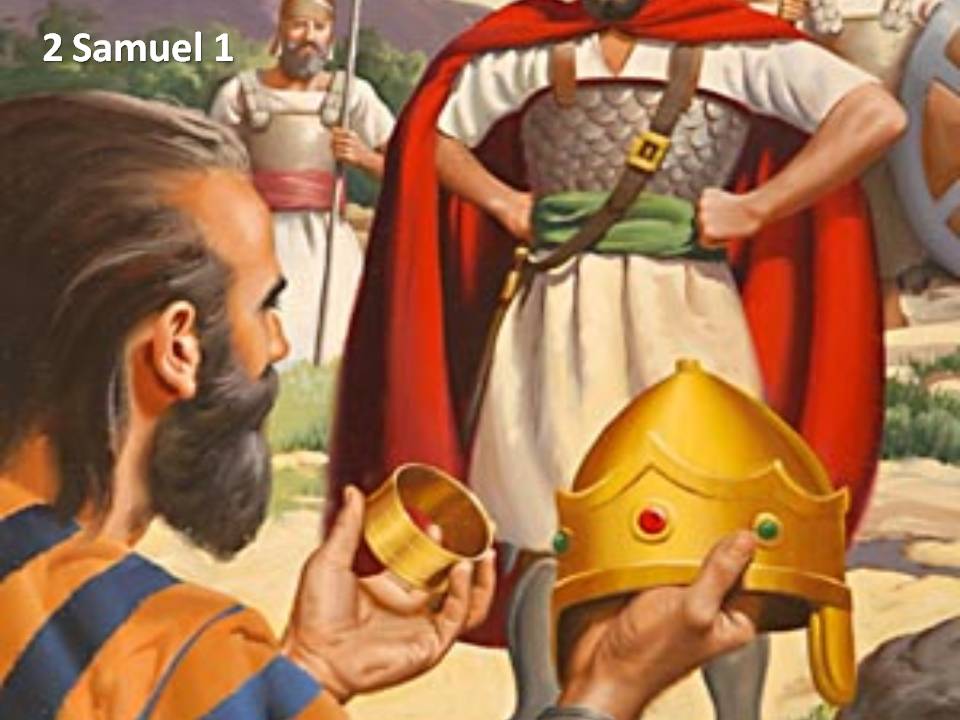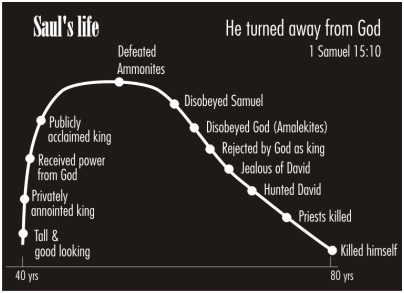
2 Samuel 1
Bible Passage: 2 Samuel 1
Saul is dead.
The story of Israel’s first earthly king ends here, rather tragically. In the battle with the Philistines, Israel has lost terribly. Saul’s sons were killed, including Jonathan, the beloved friend of David.
In the previous chapter, we read that Saul has fallen on his own sword, after his armorbearer would not agree to kill him. He was already very badly wounded by the archers and at that moment, he decided that he would rather kill himself than to be killed by the Philistines.
However, in today’s reading, apparently, an Amalekite came to David and reported that he had been the one who killed Saul, bringing even the king’s crown and bracelet to offer to David. It seemed as though he had deliberately done so to gain favour with David, the next king, and David was aware of it,
“when someone told me, saying, ‘Look, Saul is dead,’ thinking to have brought good news, I arrested him and had him executed in Ziklag—the one who thought I would give him a reward for his news.” (2 Samuel 4:10)
I am not absolutely sure whether his report is true or whether he is lying just to get a reward. I am equally unsure whether David knows if he is lying or whether he believed what was reported. However, based on the Amalekite’s own testimony (2 Samuel 1:16), David executed him.
God’s anointed – He will personally deal with him
On several occasions, David kept himself from doing harm to Saul, for he recognised that Saul was God’s anointed.
And he said to his men, “The Lord forbid that I should do this thing to my master, the Lord’s anointed, to stretch out my hand against him, seeing he is the anointed of the Lord.” (1 Samuel 24:6)
And in today’s story, a harsh punishment was given to the Amalekite who claimed to have killed the Lord’s anointed.
There are two reasons why we should not take it into our own hand to harm/”punish” the Lord’s anointed as can be seen in the verse below:
But David said to Abishai, “Do not destroy him; for who can stretch out his hand against the Lord’s anointed, and be guiltless?” David said furthermore, “As the Lord lives, the Lord shall strike him, or his day shall come to die, or he shall go out to battle and perish. (1 Samuel 26:9-10)
Firstly, we are not without guilt when we harm/kill someone, even if we deemed it as executing justice. We usually like to take matters into our own hand, and we like to think of it as fulfilling God’s will and God’s righteousness. However, vengeance is the Lord’s and it takes trust and patience on our side to hold on to that. Today, we may not physically harm someone, but how about our speech and indirect actions?
Secondly, God will definitely deal with His anointed, especially when he has gone down the wrong path. Surely, God is watching and He knows; we need to wait on the Lord and trust in Him.
Today, we are all God’s anointed (2 Cor 1:20-22). Having this special status means the protection of God, but it also means that we are accountable to God for all our deeds.
David’s excellent character
I would like to end off with a note on David’s excellent character regarding the death of Saul, his long-time enemy. Any normal man of flesh and blood would have at least heave a sigh of relief, or be secretly happy about his death. However, I believe that David was genuine in his grief and mourning.
I initially thought that David was mourning for Israel’s defeat more than grieving over the death of Saul and Jonathan. However, in his lamentation, David was sincere in mourning over the loss of Saul and Jonathan, calling them “beloved” and “mighty”. How much of our enemy’s positive traits can we see?
May we learn from David not to take it into our own hands to do harm to someone who had done wrong to us, but to trust in the Lord’s deliverance. Let us learn from David’s excellent character, not to dwell on the person’s shortcomings and sins, but to let go of past hatred and hurt.



